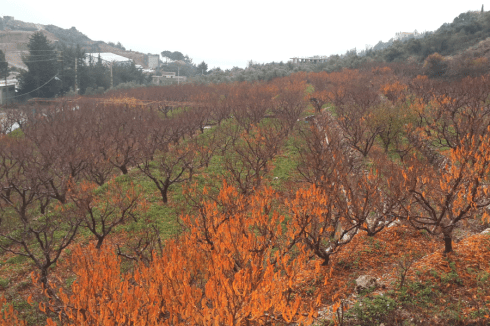 Ein Zebde peach orchards
Ein Zebde peach orchards
This is one of those photos that shore up all literary descriptions you’ve ever read of Lebanon as the land of milk and honey.
Because only that sort of blessed (but unfortunately cursed too) land could produce Lebanese food. More than the landscape, the mountains, my personal emotional response to a still functioning society of Arab Christians, the post-nightmare joy that even a partly-Resurrected Beirut must offer, and more, even, than the boys — it’s the food that makes Lebanon one of the top entries on my list of must-visits. The boldness of the Lebanese culinary imagination reflects such care for both the sensuality and sanctity of food that I can’t helped being moved by just reading descriptions of it. China, India and France (mmm…yeah, ok, Iran too) are the only places that can compete, I think, with this tiny little corner of the Mediterranean in sheer kitchen creativity.
Mansoufe (below), for example: made of pumpkin-and-bulgur balls, cooked with caramelized onions and flavored with sour grape juice. Where else would people even think of this? (Though I think “dumplings” or something might have been a better word; “balls” makes it sound like pumpkins have testicles.)
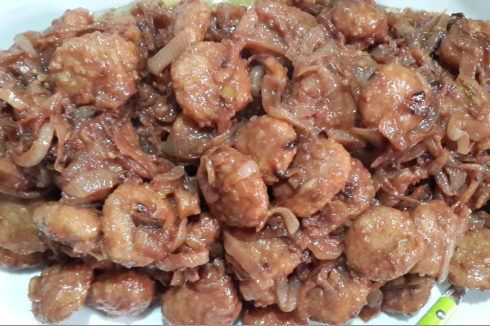
But just like there’s not really any French food without the produce of France itself, and like I’ve come to believe what most South Asian friends think: that there’s no good regional Indian food outside of India, just Punjabi versions of dumb-downed Doabi-Mughlai food cooked by Sylhetis (though I know two good Bengali places in New York, one in Sunnyside, where you have to convince them you want the real stuff, and one in the Bronx, and an even better secret, a great Sindhi vegetarian place in Jackson Heights…Indian vegetarian is the only vegetarian food I’ll eat, actually the only vegetarian food I’ll honor by calling “food”), so, it seems, that if you want something other than stale felafel or inedible tabbouleh made by a dude who had too many lemons he needed to get rid of and who needs to be told that parsley isn’t a vegetable, then you need to go to Lebanon.
In steps the Food Heritage Foundation to help you get your bearings food-wise once you’ve gotten yourself to Lebanon: a great resource for anything you might want to know about Lebanese cuisine. Yesterday they posted photos of the Ein Zebde (the Shouf village with the peach orchards at top) celebration of the Feast of the Holy Cross, and the annual potato-kibbe-making event the women there have held for the past twenty-four years. Check out the page for captions on the pics below:
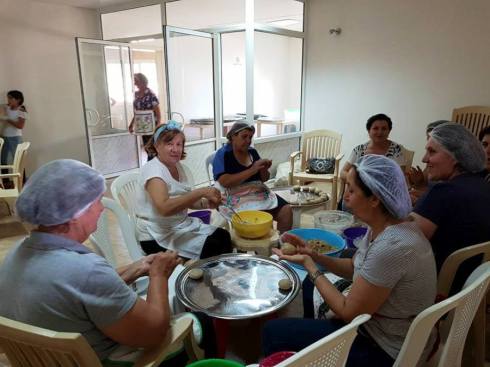
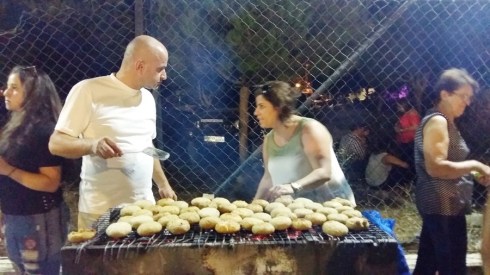
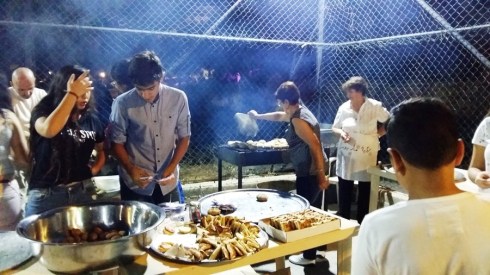
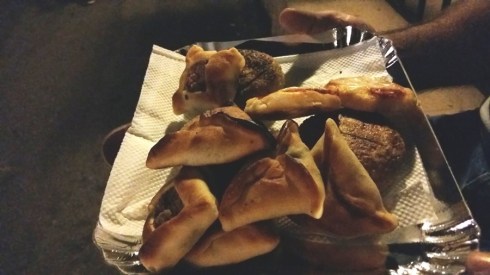
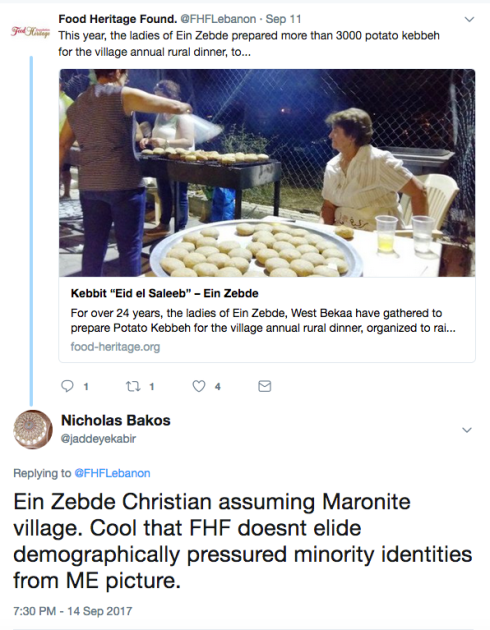
Yesterday I tweeted my kudos to the Food Heritage Foundation (above). But actually it would have been impossible to hide the fact this is a Maronite community even had they wanted to. Even if they felt they didn’t have to explain why the women were doing this, the women’s hair and bare arms would have been a giveaway.
Still, I’m just saying this because if certain people like Mlle I___m de M_____i had their way both the entire staff of the Food Heritage Foundation and I would’ve been thrown in jail for fomenting sectarianism, publicly shamed for being Islamophobic and made to wear a Green “I”, and the Ein Zebde post would have had to be mysteriously cleansed of its Christianess.
The feast of the Holy Cross — I doubt any Catholics remember or even know — commemorates the discovery by the Empress Mother Helen of the Holy Cross on which Christ was crucified, of which Mark Twain famously said there were so many splinters of everywhere that it was apparently a Holy Forest. She was the mother of Constantine, the emperor who moved the capital of the Roman Empire from Rome to the city on the Bosporus called Byzantion, renamed Constantinople (that’s İstanbul for those that don’t know), and who, like a good mother-ridden Greek boy (though he was really from what’s now Niš in in what’s now southern Serbia), unfortunately made what-a-monotheist-drag Christianity the official religion of the Empire to make her happy; though also like a good Greek boy he passive-aggressively wasn’t himself baptized till he was on his death-bed. The discovery of the Cross and the feast of Sts. Constantine and Helen, “the Equal-to-the-Apostles”, on May 21st, when Athens is paralyzed by traffic for three days because a quarter of the city is named Kosta or Helene and another half is going to visit them for their name-day, is usually commemorated in the Orthodox Church by the same image:
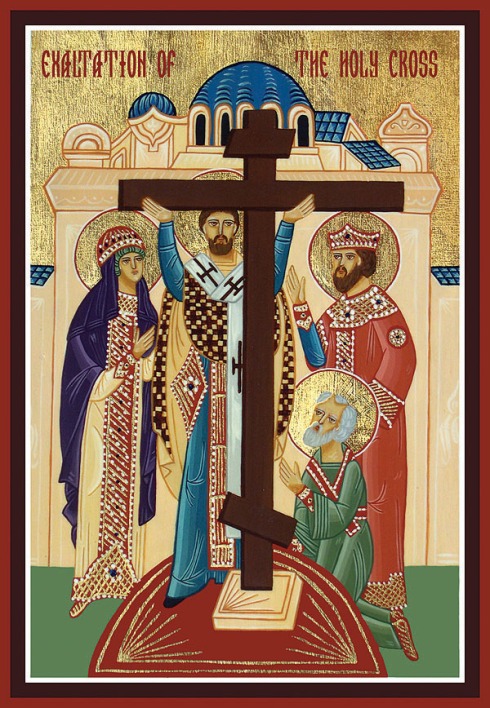
But for more fun, more lyrical descriptions of Lebanese food, mixed up with some serious butch conflict-zone reporting and a hilarious Middle Eastern mother-daughter-in-law relationship, see Annia Ciezadlo’s beautiful Day of Honey: A Memoir of Food, Love and War.
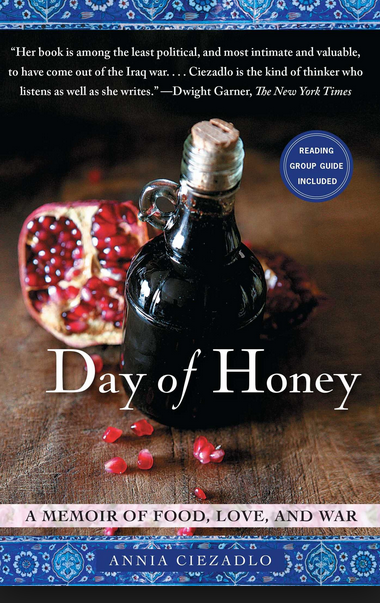
–
Comment: nikobakos@gmail.com
–























